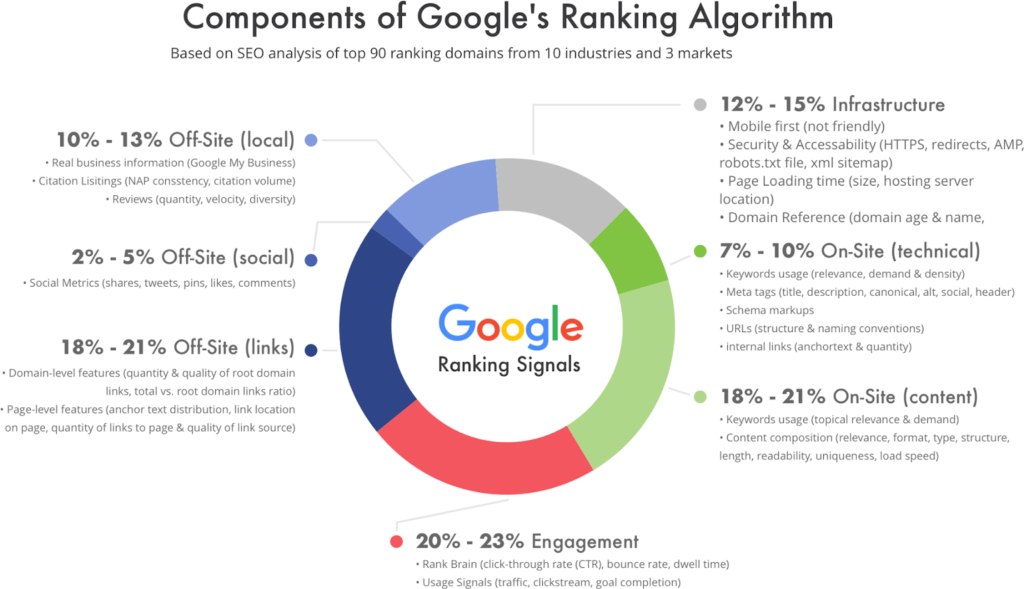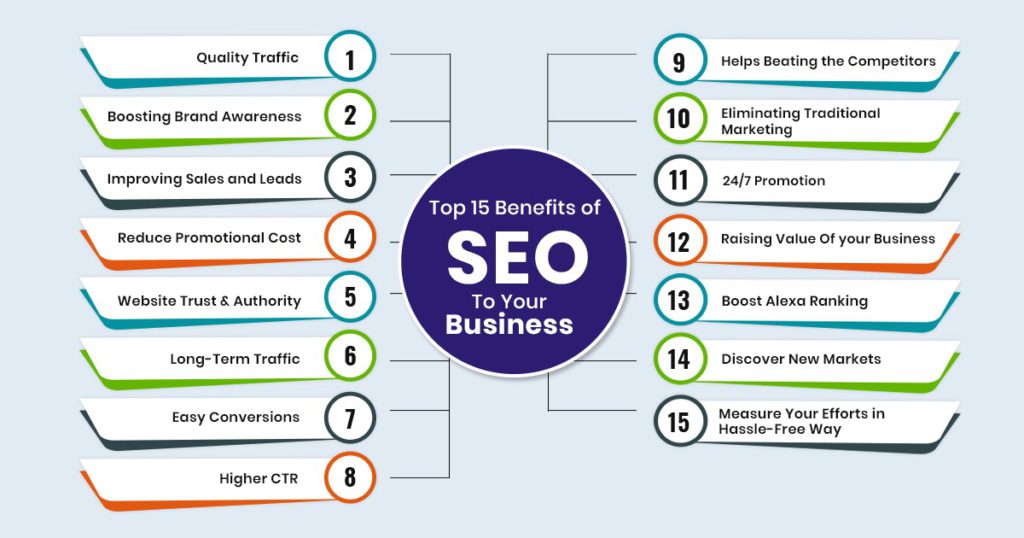Website SEO: A Beginner’s Guide To Top Google Rankings

Table of Contents
- What is SEO?
- The Basics of SEO
- Getting Started
- Traffic-Generating Benefits of SEO
- Why You Need SEO
- Key Takeaways
- Conclusion
- FAQs
How do you expect to stand out in a world with over 1.7 billion websites, with new ones being established every second? As more individuals use the Internet regularly, the competition for online attention is heating up.
In such a scenario, SEO is not just an option; it’s a requirement. It entails ensuring that your website is in good working order. Everyone understands the importance of getting people to visit your website, particularly if you’re a company attempting to gain traction.
The idea of attracting visitors to a website is exciting. In this article, we’ll cover practically everything you need to know about website SEO and attracting new visitors.
What is SEO?

Google’s algorithm uses SEO or search engine optimization to determine how to rank web content. But, it’s not just about Google. SEO concepts apply to practically any platform with a search engine, including Bing, Etsy, YouTube, and Pinterest, to mention a few.
SEO needs both technical and aesthetic abilities to get it right; so, don’t worry if you’re not technically savvy. All you need to know is how Google “crawls” and “indexes” the web to locate information on the technical side. You should examine what makes exceptional content that ranks high in Google’s SERP at a more aesthetic level. The primary reason for the importance of website SEO is that it generates free traffic for your site.
The Basics of SEO
Search engines such as Google and Bing use crawlers, often known as bots or spiders, to collect information on all of the content available on the Internet. The crawler visits a well-known online page and then follows internal and external links to other pages. When a search engine’s crawler visits a page, the information on that page and the links it follows helps it determine what that page is about and how it’s related to all of its other pages in its extensive database.

Whenever a user enters a search term into the search box, the search engine applies complex algorithms to deliver the query’s most accurate and relevant results. Websites with text, news stories, photos, videos, local company listings, and other niche content are within the organic results.
An ever-changing set of variables goes into search engine algorithms to stay updated with the ever-changing preferences of users and the latest developments in machine learning.
Getting Started
The following are simple steps that will enable you to get started with SEO on your website.
- Make your site search engine crawlable
- Relevant content to the searcher’s query
- Improved keyword density to better attract searchers and engines
- User-friendly, fast-loading site with an attractive user interface.
- Shareable content that generates citations, links, and amplification
- If you want a high CTR (click-through rate) in the search results, employ a catchy title, URL, and description.
- If you want to make your website stand out in the search results, use snippet/schema markup.
Traffic-Generating Benefits of SEO
1. SEO boosts traffic
It’s common knowledge that a higher ranking in the search results implies more visitors to your site.
2. Consistent traffic comes from SEO
Both active and passive traffic might result from a high search engine ranking. In comparison, social media and email marketing platforms can generate traffic surges that quickly disappear.
This occurs as a result of social media networks showing new content. Forgotten, read, or spammed emails are all common tags for emails. Ranks are passive traffic because the volume of searches on search engines is usually constant.
3. SEO generates “free” traffic
Search traffic is “free,” unlike paid ads. It is essential since search engine ads may be costly.
The Ahrefs Blog, for example, receives an estimated 390k monthly visitors from search engines, according to Ahrefs’ Site Explorer. It would cost us $1 million per month if we paid Google for that traffic.

Why You Need SEO
SEO enhances visitors’ number and quality to your website through natural search engine results. Having a higher ranking when someone searches for a term relevant to your industry increases your online visibility. There are more chances to turn quality leads into clients as a result. A well-executed SEO strategy may help your company establish itself as a trustworthy source of information and enhance customer satisfaction with your brand and website.
Key Takeaways
If you had to have five key takeaways from this article, it would be as follows:
- Invest time and energy in SEO and understand it if you are serious about getting your website to the top of the list on any SERP.
- Take both technical and aesthetic aspects of SEO into consideration while implementing it.
- If you want traffic to visit your website, use the right keywords and SEO tactics.
- Content is vital in your SEO journey. Ensure you put out quality content with the right keywords that your intended audience will potentially look for on the search engine.
- Your title, URL, meta tags, and other aspects of your website are crucial in the SEO game.
Conclusion
Optimizing your website for search engines provides relevant information to your users and establishes authority and trust to succeed with SEO. Remember, keywords and content go hand in hand. Having the right keywords as part of your SEO program and bad-quality content will not reap good results.

FAQs
Website SEO is the art and science of getting sites to rank higher in search engines like Google. Ranking higher in search engines might result in more traffic to a website because search is one of the most common means of getting information online.
The practice of performing controlled trials to improve a website’s potential to fulfill business objectives is website optimization.
The practice of extensively reviewing a website to understand better how effectively it has optimized and improved is website SEO analysis. SEO analysis necessitates a detailed check of the website’s content.
Search engine keywords are words and phrases used to find your website.
Keywords are concepts and topics that help define the topic of your content.
Google employs PageRank (PR) to rank websites in its search engine results. PageRank is a metric that indicates the significance of web pages.
Latest Blogs
Explore how Google’s 2025 AI search updates triggered ranking chaos. Learn actionable strategies to adapt your SEO for AI Overviews, zero-click searches, and SERP volatility. Stay ahead now.
Learn how to rank on AI search engines like ChatGPT, Perplexity, and Gemini by optimizing your content for authority, structure, and relevance. Stay ahead in AI-driven search with this strategic guide.
Explore the best healthcare SEO services for your medical practice. Improve online visibility and effectively reach more patients in need of your services.
Get your hands on the latest news!
Similar Posts

Artificial Intelligence
6 mins read
The Role of AI in Digital Marketing: AI Article Generators Transforming Content Creation

Artificial Intelligence
4 mins read
How AI Content Creator Is Shaping the Future of Digital Content

Digital Marketing
3 mins read